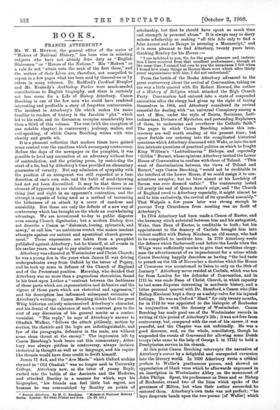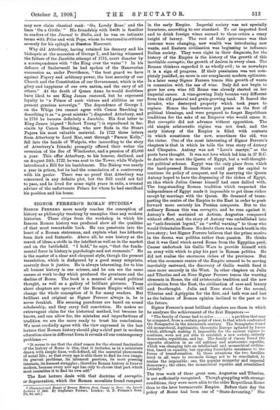BOOKS.
FRANCIS ATTERBLTRY.*
Mn. W. H. HUTTON, the general editor of the series of "Makers of National History," has been wise in selecting subjects who have not already done duty as "English Statesmen" or "Heroes of the Nations." His " Makers " as a rule do not "attain unto the rank of the first three," and the writers of their Lives are, therefore, not compelled to repeat in a few pages what has been said by themselves or by others in many volumes. Dr. Radford's Cardinal Beaufort and Mr. Kennedy's Archbishop Parker were much-needed contributions to English biography, and there is certainly not less room for a Life of Bishop Atterbury. Canon Beeching is one of the few men who could have rendered interesting and profitable a story of forgotten controversies. The incident in Atterbury's life which makes his name familiar to readers of history is the Jacobite " plot " which led to his exile, and its discussion occupies considerably less than a third of this volume. The rest (with the exception of one notable chapter) is controversy ; jealousy, malice, and evil-speaking, of which Canon Beeching writes with wise charity and gentle wit.
It is a pleasant reflection that modern times have gained some control over the emotions which accompany controversy. Before the days of the newspaper or the pamphlet, it was possible to level any accusation at an adversary without fear of contradiction, and the printing press, by restricting the start of a lie, had by Atterbury's time provided an elementary guarantee of veracity. But any admission of sympathy with the position of an antagonist was still regarded as a base desertion of one's own side, and the habit of mud-throwing had not yet been discredited. It may be that there is an element of hypocrisy in our elaborate efforts to discover some- thing just and right in an opponent's contention, and the attempt is capable of being used as a method of increasing the bitterness of an attack by a cover of candour and amiability. But these are only the defects of a new way of controversy which has brought on the whole an overwhelming advantage. We are accustomed to-day to public disputes even among Church dignitaries ; but a modern Bishop does not describe a Canon as "dishonest, leering, splenetick, and sawcy," or call him "an ambitious wretch who makes insolent attempts against our antient and apostolical church govern- ment." These expressions are taken from a pamphlet published against Atterbury ; but he himself, at all events in his earlier years, was apt to pay similar compliments.
Atterbury was educated at Westminster and Christ Church; he was a young don in the years when James II. was driving undergraduates away from Oxford by the terror of Popery, and he took up arms in defence of the Church of England and of the Protestant position. Macaulay, who decided that Atterbury was no more than a pugnacious rhetorician, found in his tract upon Luther a "contrast between the feebleness of those parts which are argumentative and defensive and the vigour of those parts which are rhetorical and aggressive," and his description has influenced subsequent estimates of Atterbury's writings. Canon Beeching thinks that the great Whig historian entirely misconceived Atterbury's character, and his denial of the existence of such a contrast goes to the root of any discussion of his general merits as a contro- versialist. "The reply," he says of Atterbury's answer to Obadiah Walker, "follows the attack pitilessly, section by section, the rhetoric and the logic are indistinguishable, and few of the paragraphs, defensive in the main, are without some clean thrust at the enemy." The impression left by Canon Beee. hing's book bears out this commentary; Atter- bury was always pitiless in controversy, always incisive, rhetorical in thought as well as in language, and his rapier- like thrusts would have done credit to Swift himself.
James II. fled, and the "Ave Maria" which Oxford urchins rhymed to "Old Obadiah " was no longer said in University College. Atterbury now, as the tutor of young Boyle, rushed into the battle of the Ancients and the Moderns, and attacked Bentley in a manner for which, says his biographer, "his friends can feel little but regret, not because he was overmatched by Bentley on points of • Francis Atterbirry. By H. C. Beeching. "Makels of National History" Series. London : Sir Isaac Pitman and Sons. [3s. 6d. net.]
scholarship, but that he should have spent so much time and strength in personal abuse." It is always easy to decry minute scholarship as making "all this Ado only to find a false Accent and an Escape in perusing a Manuscript," and. it is more pleasant to find Atterbury, twenty years later, thanking Bentley for his Horace :-
"I am indebted to you, Sir, for the great pleasure and instruc- tion I have received from that excellent performance; though at the same time, I cannot but own to you the uneasiness I felt when I found how many things in Horace there were which after thirty years' acquaintance with him, I did not understand."
From the battle of the Books Atterbury advanced to the great controversy about the revival of Convocation, taking on the way a little quarrel with Sir Robert Howard, the author
of a History of Religion which attacked the High Church Party. Convocation had entered into a state of suspended animation after the clergy had given up the right of taxing themselves in 1664, and Atterbury considered its revival essential for dealing with "an universal Conspiracy among a sort of Men, under the style of Deists, Socinians, Lati- tudinarians, Diviners of Mysteries, and pretending Explainers of them, to undermine and overthrow the Catholic faith."
The pages in which Canon Beeching relates this con- troversy are well worth reading at the present time ; but space forbids our entering into the complicated historical questions which Atterbury discussed with Wake, or into the not less intricate questions of practical politics on which he fought King William's "Latitudinarian" Bishops, and especially " Gibbie " Burnet, whose opinions Atterbury incited the Lower House of Convocation to confuse with those of Toland. "This want of discrimination between the views of Toland and Burnet," says Canon Beeching, "would not be creditable to the intellect of the Lower House, if we could assign it to con- scientious scruples; but no blow aimed at his Lordship of Sarum was ever deemed unfair." The controversy lasted till nearly the end of Queen Anne's reign, and "the Church of England owed to Atterbury especially, it might almost be said to him exclusively, the revival of its synodical assembly." That Walpole a few years later was strong enough to prevent Tory Churchmen from meeting was no fault of Atterbury's.
In 1704 Atterbury had been made a Canon of Exeter, and the harmony which subsisted between him and his antagonist, Wake, then Dean of Exeter, is creditable to both ; but his appointment to the deanery of Carlisle brought him into violent conflict with Bishop Nieolson, an old enemy, who had to be compelled to institute him. In 1710 Atterbury wrote the defence which Sacheverell read before the Lords when the Whigs were sufficiently unwise to give that worthless clergy- man the advertisement of an impeachment for a crime which Canon Beeching happily describes as having "the bad taste to preach on the 5th of November a doctrine which the House
of Commons was accustomed to listen to only on the 30th of January." Atterbury never resided at Carlisle, which was too far from London for the defender of Convocation, and in 1711 he was made Dean of Christ Church, in which capacity he had some disputes interesting in academic history, and a bitter personal quarrel with Dr. Stratford, a Canon who (like Bishop Nicolson) kept a diary as a safety-valve for his injured feelings. He was an Orford " Head " for only twenty months, for in 1713 he was appointed to the bishopric of Rochester in conjunction with the deanery of Westminster. Canon
Beeching has made good use of the Westminster records in writing of this period of Atterbury's life ; it was not free from controversy, but, compared with the rest of his career, it was peaceful, and the Chapter was not unfriendly. He was a good diocesan, and, on the whole, conciliatory, though he suspended the curate of Gravesend for allowing some Dutch troops (who came to the help of George I. in 1715) to hold a Presbyterian service in his church.
At this point Canon Beeching interrupts the narrative of Atterbury's career by a delightful and unexpected excursion
into the literary world. In 1690 Atterbury wrote a critical
preface to Walter's posthumous poems, and showed an appreciation of blank verse which he afterwards expressed in an inscription in Westminster Abbey on the monument of John Philips. Sprat, his predecessor as Dean and as Bishop of Rochester, erased two of the lines which spoke of the greatness of Milton, but when their author succeeded he restored them. Atterbury's own taste was not perfect ; "he lays desperate hands upon the two poems [of Waller] which may now claim classical rank : Go, Lovely Rose,' and the lines 'On a Girdle.'" His friendship with Swift is familiar to readers of the Tournal to Stella, and he was on intimate terms with Prior and with Pope, whom be ventured to criticise severely for his epitaph at Stairton Harcourt.
Why did Atterbury, having retained his deanery and his bishopric at the accession of George I., and having witnessed the failure of the Jacobite attempt of 1715, court disaster by a correspondence with "the King over the water " ? In his defence of Sacheverell he had spoken of the Hanoverian succession as, under Providence, the best guard we have against Popery and arbitrary power, the best security of our Church and the Constitution of our Government, which is the glory and happiness of our own nation, and the envy of all others." At the death of Queen Anne he would doubtless have liked to see King James restored, but he expressed loyalty to "a Prince of such virtues and abilities as our present gracious sovereign." The dependence of George I. on the Whigs (we cannot agree with Canon Beeching in describing it as "a great mistake ") disgusted Atterbury, and in 1716 he became definitely a Jacobite. His first letter to King James (signed "Robert Young ") is reproduced in fac- simile by Canon Beeching, who now finds in the Stuart Papers his most valuable material In 1722 three letters from Atterbury to Lord Mar, sent through "Parson Kelly,' fell into the hands of Walpole, who (according to the story of Atterbury's friends) promptly offered their writer the reversion of the See of Winchester, and a pension of 25,000 a year. This offer Atterbury, to his honour, declined, and on August 24th, 1722, he was sent to the Tower, while Walpole introduced a Bill for his banishment. The Bishop was nearly a year in prison, but he had the consolation of a controversy with his gaoler. There was no proof that Atterbury was concerned in any definite plot, but the Bill could not fail to pass, and he lived for some eight years in exile, a trusted adviser of the unfortunate Prince for whom he had sacrificed his position and his home.



























































 Previous page
Previous page